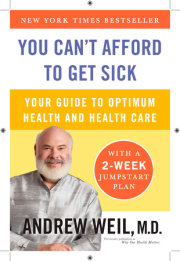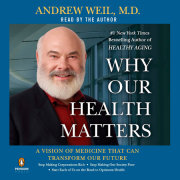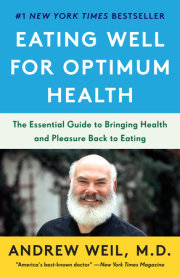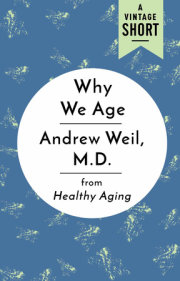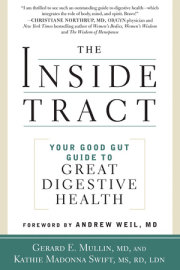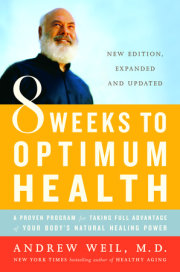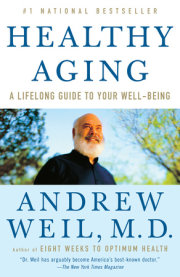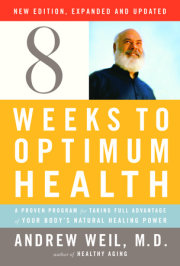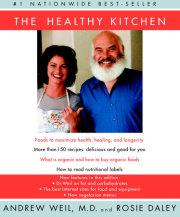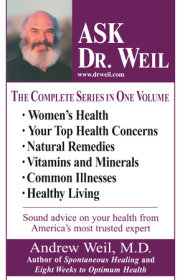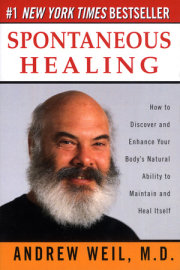CHAPTER 1 You Have a Right to Good Health Care
“I now understand that when you lose your health, nothing else that you have matters. All you can think about is being well again.”
That’s what a patient of mine said to me recently, a woman in her mid-sixties who was well until a sudden painful illness, an inflammation of bones in her pelvis, disabled her completely and landed her in a hospital. Even with bed rest and aggressive drug treatment, her recovery was slow. For several weeks she lost control of her life, felt helpless and dependent.
It often takes an experience like this to make us realize the paramount importance of health. Without it, the worth of life diminishes.
I have long taught that health is an individual responsibility. It is up to you to learn how to maintain it and to protect your body’s potential for self- healing as you go through life. No doctors, no treatments, no system can do this for you or force you to do it on your own. Medical professionals and institutions can help, however, by improving your understanding of health. They can inform you about the influence of lifestyle choices on your risks of disease. They can provide preventive medical services to protect you from common serious conditions— for instance, by immunizing you against infectious illnesses and screening you for forms of cancer that are curable if detected early. They can identify and explain problems that require expert diagnosis and treatment, and then guide you in selecting the best therapy. Usually, the health- care establishment will be there for you if you are a victim of trauma, suffer a heart attack, or need other emergency medical or surgical attention.
I believe strongly and passionately that every American has a right to good health care that is effective, accessible, and affordable, that serves you from infancy through old age, that allows you to go to practitioners and facilities of your choosing, and that offers a broad range of therapeutic options. Your health- care system should also help you stay in optimum health, not just take care of you when you are sick or injured. You should expect and demand this of your country, whether you are rich or poor and whatever the circumstances in which you live. A free democratic society must guarantee basic health care to its citizens— all of them— just as it guarantees them basic security and safety. It is in society’s interest to do so: The healthier our population, the stronger and more productive we will be as a nation.
Our Declaration of Independence identifies life, liberty, and the pursuit of happiness as inalienable rights of all persons. A stated intent of our Constitution is “to promote the general Welfare.” These documents say nothing about the right to good health. Yet, as I’ve said, without health, life is diminished. Loss of health restricts liberty as much as imprisonment does. Without health, the possibility of happiness is drastically reduced. To enjoy our inalienable rights we must be healthy, which means we must also have access to good health care.
Too many Americans today do not have that. In fact, we do not have a “health-care” system at all. Instead, we have a disease management system that is horribly dysfunctional and getting more so every day. Our health is deteriorating, and we have the highest percentage of uninsured citizens of any democratic society; no other nation comes close. With unemployment rising at an alarming rate, great numbers of Americans are losing their health insurance along with their jobs, further swelling the ranks of the uninsured. This is unacceptable if we want our nation to be a model democratic society.
We used to boast that American medicine was the best in the world, and once upon a time, it was. Today, with limited exceptions, that is no longer true. Even in some of our most prestigious medical centers the quality of care is poor, with nursing services in short supply and hospital- caused illness on the rise. In fact, we are beginning to see a trend toward outsourcing of care to other countries. Our citizens— American citizens— are going to first-class hospitals in Belgium, Thailand, and India for hip replacements, coronary artery bypasses, and reconstructive surgeries. Patients here are dissatisfied, frustrated, and increasingly angry about insufficient attention from doctors in managed care settings, the impersonal nature of medical encounters, and the adversarial attitude of insurers, not to mention the staggering costs of prescription drugs, medical tests and procedures, and hospital services.
I am sure you or people you know have had disastrous interactions with our so— called health— care system, resulting in physical, emotional, or financial harm. Almost daily I hear medical disaster stories from patients, colleagues, friends, and those I meet when I give talks on the subject. Some have been misdiagnosed and mistreated. Others have come out of hospitals and clinics with more and worse problems than they had when they entered. Still others have been denied health insurance because of common preexisting conditions. The most unlucky ones were denied treatments for life-threatening diseases because insurance companies deemed the treatments “experimental” or “unnecessary.” More and more Americans are taking their chances by going without insurance altogether— they simply can’t afford it. Without access to primary care physicians, they go to the emergency room instead of a doctor’s office.
Doctors, for their part, are dissatisfied, frustrated, and increasingly angry about losing autonomy to corporate bosses and payers. The emotional reward of the therapeutic relationship has dwindled because “the system” has limited the time of patient visits in order to save money. Selection of treatments is dictated by policies of reimbursement, not by practitioner judgment and experience. Many good doctors are leaving the practice of clinical medicine. In the past few years a dismaying number of physicians have told me that they regret their choice of medicine as a career. A recent survey of U.S. primary care providers documents this trend: Nearly 50 percent said they would seriously consider getting out of medicine if they had an alternative. I cannot blame them. Most people I talk to— patients, doctors, and other health-care providers — feel powerless to do anything to change the cost of health care, its impersonality and the minimal time allowed for visits, or the reimbursement practices of insurers. Most of us feel as if we are up against implacable forces and institutions that are beyond our influence.
You know all this, or most of it. There are plenty of words in function and accelerating collapse. You don’t need me to give you more depressing details, facts, and figures or make you feel more anxious and angry about the colossal mess that is American health care.
What you may not know and what I must emphasize, even if you have heard it before, is that we spend more per capita on health care than any other nation in the world— by a long shot. Yet, by virtually every measure of health outcomes, including longevity, infant mortality, fitness, and rates of chronic diseases, we are at or near the bottom compared to other developed countries. We are paying more and more and have less and less to show for it. We are also paying more and more for health insurance plans that cover less and less. The average American family’s premiums now exceed the gross annual income of a full- time minimum wage worker.
Costs of medical care have spiraled out of control, rising at such an accelerating rate that they have become a leading cause of personal bankruptcy. (Every thirty seconds someone in America files for bankruptcy in the aftermath of a personal health problem.) Despite a citizenry so clearly in dire need of help, when I listen to talks about health care in America, especially from politicians and candidates for high office, I hear next to nothing about the real causes of the present crisis or the radical changes required to address it. I do not mean “radical” in the political sense— that is, left-leaning solutions such as socialized medicine in which the government runs the show. The word comes from the Latin, radix, meaning “root,” and only changes that go to the root of the health-care crisis can save us from disaster. Most commentators assume that the root problems are (a) how to give more people access to the present system and (b) how to pay for it. I strongly disagree.
The challenge is not figuring out how to give more people access to this disintegrating system. The challenge is to envision what we can create to replace it. In this book I will give you a picture of the kind of health- care system that America should have and that every citizen should demand. I will focus on medical philosophy and practice, my areas of expertise. I am not an expert on policy or medical economics, and therefore I will not make recommendations in either of those areas. It is the government’s job to find the money for the new system, and it should— must— recoup the millions of dollars lost to the present system’s administrative waste. The government must also end the abuses of those individuals and corporations in the health-care industry that are making outrageous profits while so many Americans cannot afford to buy health insurance or pay their medical bills.
I believe I have a unique perspective on the problem. I have worked for three decades to promote health, to encourage greater self-reliance and responsibility for well-being, and to transform medical education and medical practice in the ways needed to support a radically new and better health-care system for our country.
It is obvious to me that the root of the crisis is unmanageable costs. Over the past hundred years medical bills have gone up steadily and relentlessly. Worse, the rate of increase has accelerated, especially in the past few decades. Maybe the insane amounts of money that we spend on health care would be justified if they resulted in superior health of Americans, but, as I’ve said, they do not.
To understand how health care in our country has become the disaster it is today, just follow the money as it makes its way to the big health insurers, manufacturers of pharmaceuticals and medical devices, and for- profit hospitals, and into the pockets of their breathtakingly overpaid executives. If we cannot contain these costs and stop their accelerating rise, there will be no solution to the crisis and no hope of avoiding catastrophe. The best superficial fixes will merely postpone the inevitable. Even an efficient and fair system of national not- for- profit health insurance for all Americans will eventually be taken down by unmanageable costs. (Runaway costs will also sink the health- care systems of other countries, even those that now seem to be faring better than ours— Canada, the United Kingdom, and Japan, to name a few. Sooner or later the crisis that has brought American health care to its present sad state will engulf all developed countries.)
Why is health care so expensive?
I have two answers to that question:
First, because we give little more than lip service to the prevention of disease and the promotion of health, the whole industry of health care is geared toward intervention in established disease— much of it preventable. “An ounce of prevention is worth a pound of cure” is more than a cliché; it is a profound truth that translates directly into dollars spent.
Second, the kinds of interventions that the present system favors are expensive because they depend on costly technology. The Congressional Budget Office reports that 50 percent of recent increases in the cost of health care are attributable to the introduction of new technology. (I include pharmaceutical drugs in the category of treatments dependent on expensive technology.)
Our long- term goal must be to shift our health-care efforts from disease intervention to health promotion and disease prevention. That does not mean withholding treatment from those who need it. My concept of prevention goes well beyond immunization, sanitation, and diagnostic screenings. I am suggesting that the time has come for a new paradigm of preventive medicine and a society-wide effort to educate our citizens about health and self care. This must include the creation of incentives and disincentives to encourage people to make better lifestyle choices, better in that they reduce risks of the chronic diseases that now absorb so many of our health- care dollars. I realize that this is a tall order, requiring that the government, private sector, and individuals all pull together and move in the same direction, but it must be done.
Breaking dependence on costly high- tech medical interventions will necessitate making fundamental changes in medical education and practice as well as rethinking the nature of health and healing, the role of treatment, and our expectations of medicine. Without a transformation of medicine we cannot have the health care we so desperately need: health care that is effective, serves everyone, and does not bankrupt us individually or collectively. It can happen. It is happening. I lead an effort at the University of Arizona to train doctors in “integrative medicine,” which values low- tech methods such as dietary change, exercise, breath control, and stress management as alternatives to outrageously priced pharmaceutical drugs. In fact, my work to advance this new field has provided part of the inspiration to write this book, because its early success makes me absolutely certain that it is key to getting American health care back on course.
My two main objectives in writing this book are to convince readers that we must:
- Change the focus of health care in this country from disease management to prevention and health promotion.
- Minimize interventional medicine’s dependence on expensive technology.
By taking these two fundamental actions I am certain that we will stop and then reverse the relentless rise of the cost of health care that has caused all the trouble. It is the radix— the root problem that must be addressed.
To get you to share my vision, it is my job to convince you that these steps are essential for our welfare. Then I will call on doctors, allied health professionals, corporate America, and you— the citizen-consumer- patient— to join the effort to fix the system.
The Three Major Myths of American Health Care
As a first step I would ask you to question a few powerful myths that support the massive enterprise of disease management that must be replaced.
Myth #1: Because America has the most expensive health care in the world, it must have the best.
Reality: The World Health Organization recently rated America thirty-seventh in health outcomes, on a par with Serbia.
Myth #2: Our medical technology is our greatest single asset.
Reality: We have powerful technology, but we misuse it and overuse it, driving up costs and worsening health outcomes.
Myth #3: Our medical schools and research facilities excel at creating the world’s finest physicians and most productive medical investigators.
Reality: Our medical and scientific infrastructure is extensive, but it is controlled by an almost fundamentalist orthodoxy that limits our ability to understand and promote health and to prevent disease.
Medical education today omits whole subject areas of great relevance to those ends, including nutrition, mind/body interactions, and environmental effects on health. We train researchers to think simplistically and focus narrowly on single interventions directed at the physical body, especially pharmaceutical drugs. (The manufacturers of those drugs strongly influence researchers, practitioners, and the journals that report research results.)
I will discuss the power of these myths and my suggestions for moving beyond them in the following chapter.
Copyright © 2010 by Andrew Weil. All rights reserved. No part of this excerpt may be reproduced or reprinted without permission in writing from the publisher.



